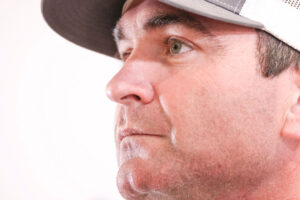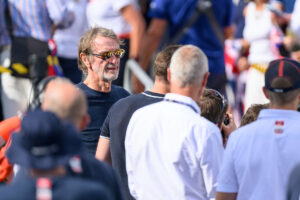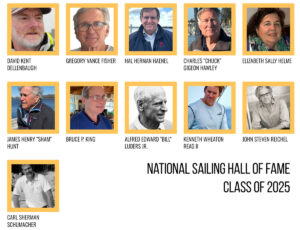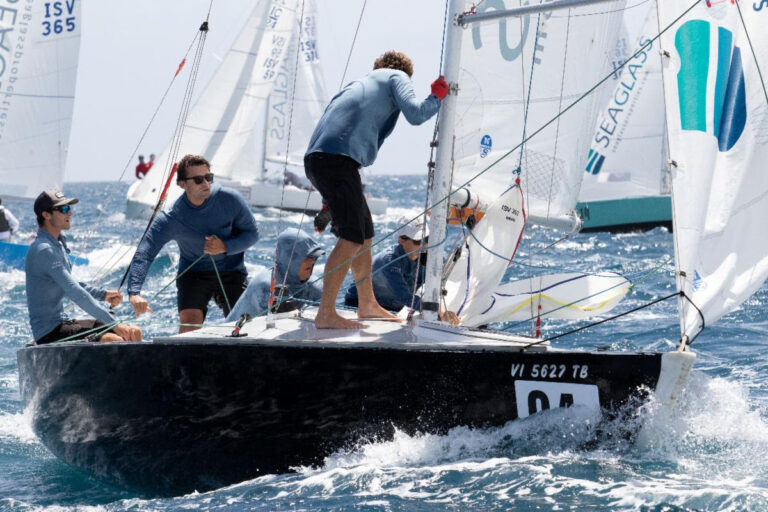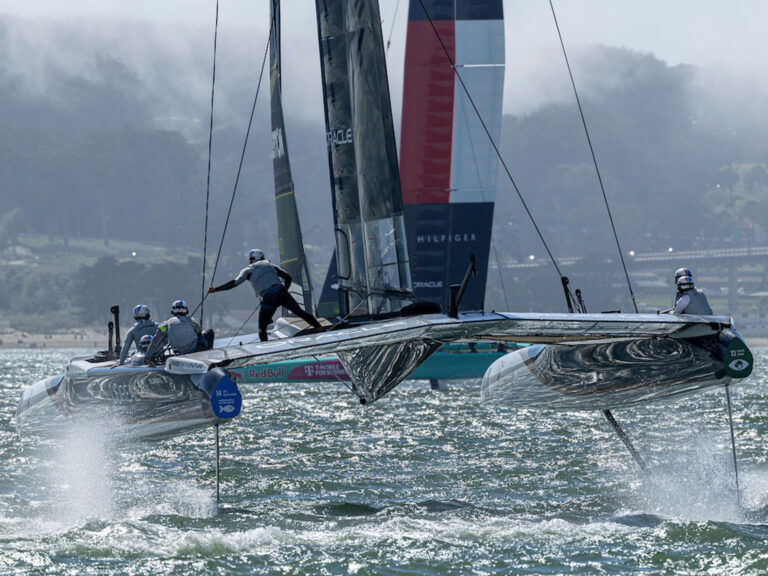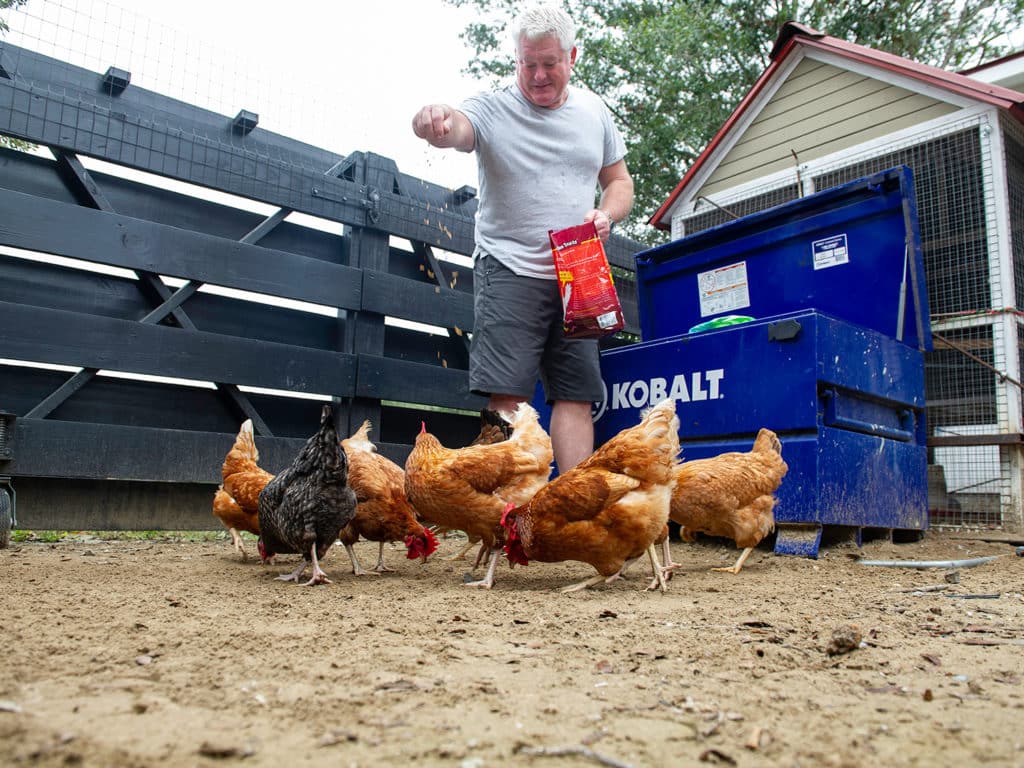
Today, the only American to have completed three solo-circumnavigation races is rarely seen in anything resembling a sailboat. To find him, you have to look skyward. Maybe he’s the guy buzzing the Low Country in a Beechcraft Premiere—because 51-year-old Brad Van Liew now prefers the open skies to the open ocean. It was back in 2010-11 when he last raced his Eco 60 Le Pingouin, taking victory in the Velux 5 Oceans race. Before that he won Class II of the Around Alone in 2002-03 with the Open 50 Tommy Hilfiger Freedom America. Those two victories came after a debut third place in the Open 50 class in the Around Alone in 1998-99.
The Around Alone started out as the BOC Challenge and was the premier solo ocean race until the advent of the Vendée Globe. This nonstop circumnavigation gathered momentum, public attention and competitors during the 1990s; by the early 2000s, it had eclipsed the Around Alone.
No French sailors competed in the Velux 5 Oceans 2010-11, but Van Liew could only beat the sailors who did show up.
It takes a great deal of persistence, talent, determination and sheer bloody-mindedness to get a commercially funded boat to the starting line of one of these races, never mind getting all the way around the world not once but three times. And yet Van Liew’s once-illustrious career in ocean racing ended badly in the wake of the 2010‑11 victory with Le Pingouin.
He suffered bankruptcy and the boat was repossessed—everything that he and his first wife, Meaghan, had built together over those three races and 15 years was lost.
Since then, Van Liew has largely disappeared from the sailing scene. He did a few record attempts with Italian circumnavigator Giovanni Soldini and his Maserati crew in 2012, but that’s about it.
“That was a pretty great way for me to decompress right after the Velux,” Van Liew says. “I love Gio to death, and we had a lot of fun and did some really cool stuff; so, I was with him for a little while… And at that point in my marriage we had a lot of financial problems….”
They were “big problems,” he says, which led to his personal bankruptcy. The business, Van Liew Adventures, that he ran with his wife Meaghan, folded in early 2012. Divorce soon followed.
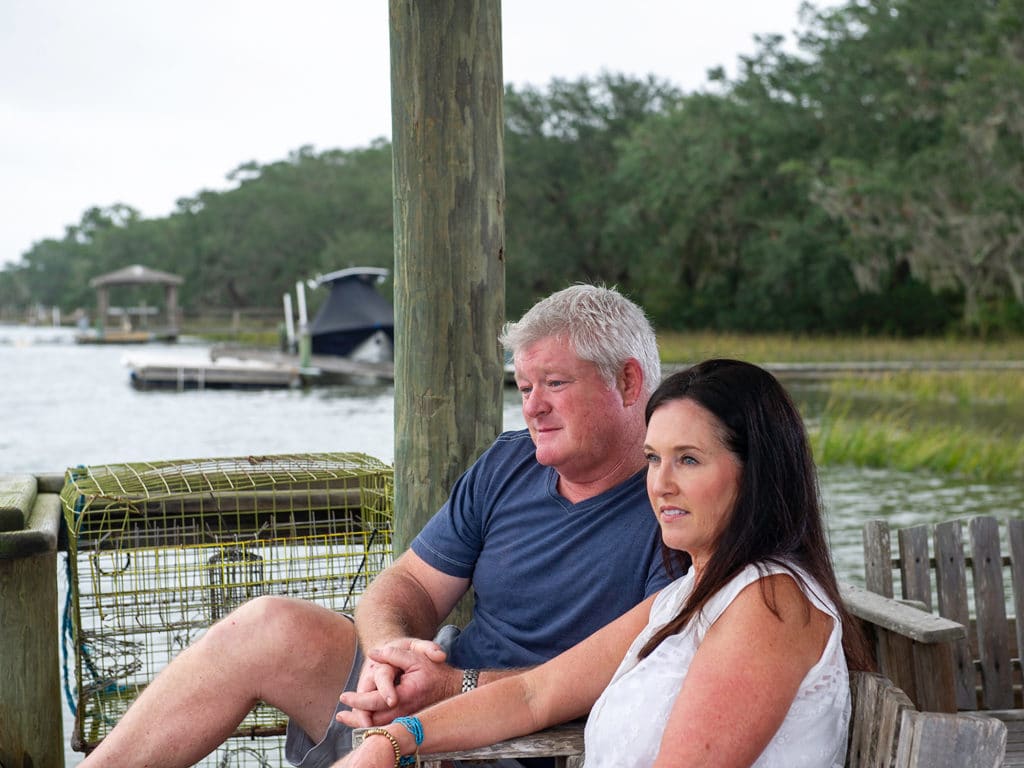
“Commuting to Italy and training there was probably a good way for me to process the transition in my life,” he says. “So, I did that for a while and then eventually ended up meeting my current wife and just settling back down in Charleston. I also decided that because my third back surgery was coming up, I was going to go back to flying.”
Today, Van Liew and his wife have a new residential real estate venture in Charleston, but over the past few years, his day to day was focused on flight instruction and flying charters. “I’d been doing that for the past number of years and helping my wife with her business; just kind of…quite frankly, hanging out in the woods, you know, at my place. There’d been a lot of coverage of me here, and it got to the point where I couldn’t even really go anywhere without having to talk about sailing with somebody I didn’t know,” he says. “It’s finally just kind of chilling out. I’m just really enjoying going out fishing and flying airplanes and doing what I do.”
The Velux 5 Oceans was expected to see a fleet of 12 or 15 boats, but only five made it to the start, with one of them pulling out soon after.
“I think the economy was such a hard part of the last chapter of my career and of the race. It was the end of me. It was the end of the race to be honest,” Van Liew says. “It was hard to have dedicated so much to the sport, to watch it all fold in on itself like that, including my own business and my own finances. It was a pretty hard pill to swallow.”
In the wake of the 2010‑11 victory with Le Pingouin, he suffered bankruptcy and the boat was repossessed—everything that he and his first wife, Meaghan, had built together over those three races and 15 years was lost.
He’s not bitter, however. He was content managing, flying and brokering jet aircraft and airplanes, and now he’s in the real estate business. “It is what it is,” he says.
Life now is better than it’s ever been, he adds. He’s happily remarried, and all is well with his kids. “I have a beautiful home and a beautiful life, it’s great,” he says. “So, it’s not like I’m crying over spilled milk. It’s just the truth of what happened is—in the time frame that it had—some things are just bigger than anybody’s ability to make them go away.”
Van Liew’s story started with big dreams and great ambition. Born in Los Angeles, he grew up in San Diego, but sailing wasn’t a significant part of his early childhood. “I was more involved in motocross and horseback riding and stuff like that,” he says. “But when I was like 6 or so, I went to a summer camp up in Puget Sound; there was a lot of sailing, and I got pretty hooked. A large portion of my father’s side of the family lives on the East Coast, and in the Newport, Rhode Island, area, and they have sailing programs in the family. The Johnstones, of J/Boats, are cousins of mine.”
Van Liew started to spend his summers in Newport, working on his uncle’s IOR boat [Alfred Van Liew’s Palmer Johnson-built two-tonner Fiddler]. “The family scene was a big influence because it was easy access to a fairly high-level program,” he says. “It was kind of a New York Yacht Club summer scene, you know…And then fairly early in the game we did a Bermuda Race, and I really enjoyed that. I think the first time I did that I was 14 or so, and just really enjoyed the long-distance voyaging component of racing.”
RELATED: Van Liew Is Unleashed Once More
What he remembers most, he says, is the sense of “really having gone somewhere.”
“One of the things that always attracted me to it was getting to a destination that makes you feel like you’re voyaging, something different: different cultures, different accent, a different language, whatever. So that’s when the long-distance stuff started, and it just blossomed from there until one summer—I think it was in 1987 maybe—the BOC Challenge was coming back into Rhode Island, and I thought it was the coolest damn thing I’d ever seen. So that’s when dreams of single-handedly winning those races started.”
There were a couple of other factors; the innovative mindset of the Open 60s was one; the great American solo star of the time, Mike Plant, was the other. “I was completely enamored with and motivated by watching Mike Plant’s development of his career. He had been very supportive; I worked for him while he was building his boats, while I was trying to make my thing happen. I really thought, ‘I’m going to get in on this, and I’m going to get in on it at a young age and make it happen.’”
By the time Van Liew decided he wanted to make a go of it, college was calling. “I was way too young,” he says, “and if I had accomplished my goal of doing the first one that I wanted to do, I would’ve killed myself.”
His first attempt was the 1990 edition, and it was, as he describes, “a disappointment, a huge disappointment. I thought I was one of those people that if I put my mind to it, I could do anything. And I failed. I had said I was going to do something that I didn’t do, so I had to tuck my tail between my legs and go finish college, get my life put back together after saying I was going to do this and not pulling it off.”
Van Liew went back to school and ended up following a path into the aviation industry. He started working as a flight instructor and flying aircraft charters from Santa Monica.
He met Meaghan, bought a 26-footer and joined the California YC.
“That was also the time frame in which Mike Plant was lost [Plant disappeared on his way to the start of the Vendée Globe in October 1992, his yacht Coyote was later found capsized], and so I had a lot of it on my brain. I guess it had been just enough time for me to heal from my disappointment.”
He married Meaghan in 1996, and decided, “You know what, I’m going to give it another try.” His new bride was a marketing professional, and the pair put together a program that got them a boat and got Van Liew around the world.
“It was a kind of…The Last of the Mohicans race, you know? And it felt like a family. I was just living on the outer end of sanity I guess. It was crazy. And I did a lot better—I think—than anybody would’ve anticipated. And I did it on 10 cents on the dollar. And I did it from the heart. It was just…it was me; me buried to my soul and proving I could do something I had said I was going to do and failed at.”
And then when it was over, he says: “I was like, ‘Well am I going back to flying? Or what should we do here?’ I sailed the boat up to Newport to put it up for sale, flew back to California…did some soul searching, and basically just said, ‘You know what, if I can, if I could really have a boat, could really have a program, I might be pretty good at this.’ And it’s all history from there.”
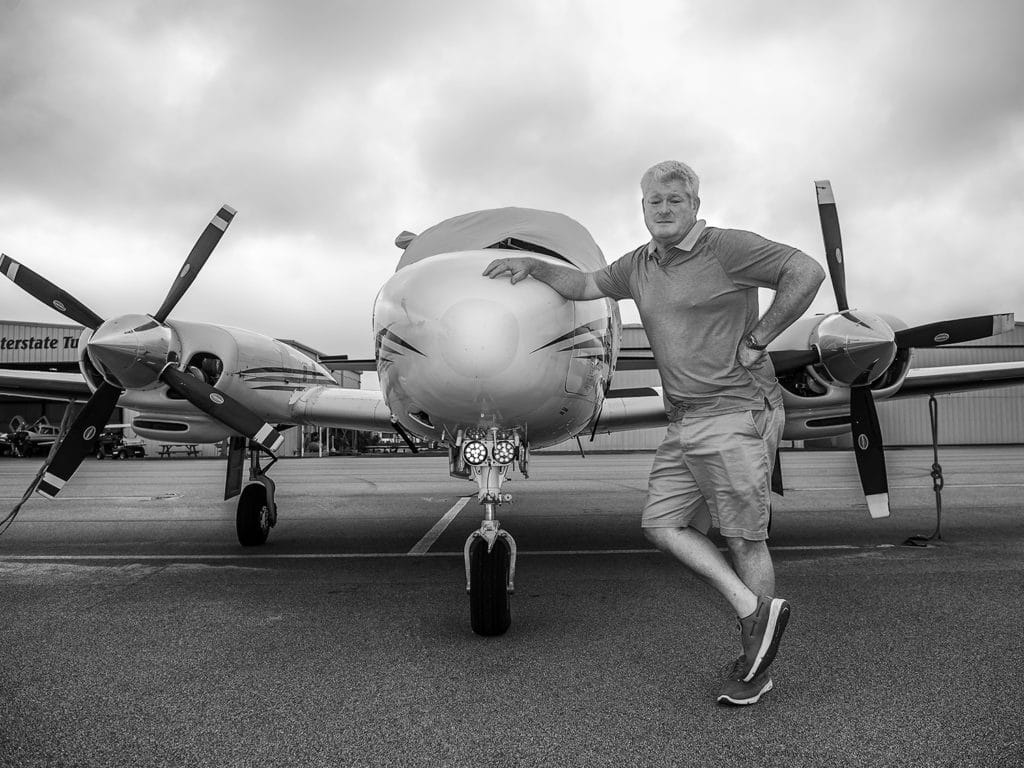
The clock has ticked through almost two decades since then. It’s more than enough time to get it all in some sort of perspective. So how does Van Liew feel about it all with the benefit of time and hindsight?
“That’s a tough one to answer,” he says. “I sure hope my son doesn’t turn around and say he wants to do it, I can tell you that…I mean, in some ways it really defines me. Mike Plant was a really important mentor to me. I’m honored to share the role that I have in the history of the sailing scene in the United States with a guy like Mike.
“I feel like I really broke the mold in some ways, because I had to be very corporate or European in the way that I had to do my programs because I didn’t have the money to do them without corporate involvement and without a corporate message.” Van Liew adds. “In some ways they’re the greatest memories I have. In some ways they’re the worst nightmares I have. I think it had a huge impact on my life and my marriage with Meaghan. And you know it’s…I’ll tell you, it doesn’t seem as important as it did when I was doing it.
“I wanted to bring more media to the sport. I wanted the story of these races to become familiar to a grander public in the United States. And it just never really did; it never clicked—it didn’t become what it is in England and France. And I wanted that to be my legacy. I was hoping that story would click and become a big deal. And it just didn’t.
“So, in that sense, I feel like I didn’t get the job done. But in the same sense, nobody else has done what I’ve done, so here I am,” he says. “It’s left me hurt: I’ve had three back surgeries; I’ve got a permanent limp; I’ll never run again. And you know, it comes with a price—it’s not a light way to live.”
These days, Van Liew doesn’t sail much. He and his second wife, Amy, charter a boat sometimes. “I don’t want to sound pompous or whatever,” he says, “but I’ve never really been a sailing-around-the-buoys kind of guy, so it’s never been my jam. I like voyages. Our biggest project right now is we recently moved into a house on the water that we really love. It was Amy’s parents’ place, and it’s just very peaceful.”
Would he ever pack the house up one day and head for the wide-open spaces of the Pacific? Not likely.
“Meaghan ended up passing away a couple of years ago, so that’s a big part of my current story,” he says. “She went in for a medical procedure, a transplant—and she never came out, January of two years ago. And my kids were, at that time, in ninth grade and sixth grade.
“That completely derailed my ability to make decisions without putting them first,” Van Liew adds. “And obviously, the type of sailing that I was doing…the solo voyaging and even the record-breaking stuff is pretty dangerous; when you’re a sole-surviving parent of two kids that you love a great deal, and you’re a husband, and a stepdad to another kid—all of a sudden none of this stuff that we’re talking about seems very important. So, I just shut all that down and enjoy being a dad and a husband.”

